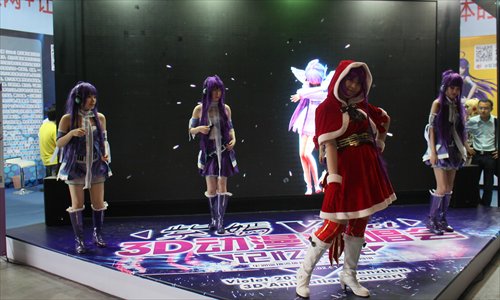HOME >> ARTS
Fanfic proves potential gold mine for Chinese IP owners
By Xiong Yuqing Source:Global Times Published: 2015-12-8 18:48:01

Showgirls on stage at ComiCUP 16 tongren fair on June 7 in Shanghai Photo: IC
Since Alibaba Pictures Vice President Xu Yuanxiang announced plans to recruit groups of scriptwriters from amateur writing websites and tongren circles at the Original VS Established IP Forum in Tianjin last month, China's tongren culture has been thrust into the spotlight.
The Chinese word tongren originates from the Japanese doujin, small independently published works that can be either a completely original creation or, as is more often the case, works are based off the original work of another - in other words, fan fiction. These tongren works can be based on a wide range of media to include ACG (animation, comics and games), novels, TV series, movies, real people or even a simple setting.
From underground to the front stage
China's tongren culture is heavily influenced by Japan's doujin ACG culture, which had its formal start with the doujin fair ComiKet in 1975. As such China's tongren generation is actually very young.
Lacking of any large scale tongren markets or clubs during the 1990s, Chinese tongren creations grew mainly underground with only a few short novels or comics published in mainstream ACG magazines. The arrival of the Internet helped bring Chinese tongren authors together and the community began to grow rapidly around 2000. Online forums soon became the central places for publishing their works and even today these forums are still very prosperous. According to a report on jiemian.com, among the top 500 Baidu ACG forums 75 are tongren forums, while 105 tongren forums number among the top 500 Baidu literature forums.
An increasing number of Chinese IP owners are realizing the value of tongren authors - they are creative, enthusiastic and inexpensive. This year's hit TV series The Journey of Flower and The Legend of Langya were promoted using fan-made music. Journey to the West: Hero is Back produced official derivatives based on ideas submitted by fan designers. Many games, movies and TV series have also begun encouraging fans to create tongren works, even going so far as to hold competitions so they can discover talented authors and painters as well.
In an interview with Duyao APP, Xu Yuanxiang explained that creators don't have enough time or energy to create everything related to an IP themselves, while fandom consists of numerous fans who are willing to write fanfic about the IPs they love. As such inviting loyal fans of an original work to write out of passion is an innovative way to promote an IP while also giving fans what they want.
Authorizing the unauthorized
Traditionally fan-made works in Japan and China were shared by selling self-produced books at fan fairs. However, since these publications are unauthorized, their sale falls into a grey area. Most original authors tend to divorce themselves from these fan-made works, while some, such as the author of the Doraemon manga, become annoyed when readers mention how they were influenced by certain fan-made works.
In recent years, conditions for the sale of fan-made works have become increasingly favorable. Some Japanese companies have even permitted the commercial sale of fan-made works. For example, game company Nitro+ permits the sale of fan doujin works so long as sales don't exceed 100,000 yen ($812).
Nowadays, online literature and comics sites such as qidian.com and u17.com allow fans to publish their fanfic novels and comics online.
"They are allowed to accept monthly gifts from their readers," Liu Rui, deputy director of u17.com, told the Global Times.
When talking about permissions, Liu explained to the Global Times that in China, since fan works can improve the popularity and vitality of the original work the original authors are more likely to support these fan creations. Some sites like u17.com even have a way for readers to submit their own fan drawings.
Despite limited commercial activities tongren creators aren't going to strike it rich.
"Since fan creations are usually unauthorized, they are limited in how they can be commercially used. Even if a tongren work is very popular, investors are still more likely to invest in the original work."
All for love
Of course most tongren creators aren't in it for the money, but do it out of love for the original work and their favorite characters. In some cases they do it so they can see their fantasies come to life, such as giving more time to smaller characters or shipping two characters that are not actually together in the original work. The latter is especially popular among fans. On some apps dedicated to fan works, popular tags include BL (Boys Love) or BG (Boy-Girl Relationship).
Song Keqing is a Chinese student studying abroad in the US. She made a special trip back to Beijing during summer vacation in 2014 specifically to attend a tongren fair for her favorite novel, Quanzhi Gaoshou. She published dozens of fanfics based on this work in forums and on her Sina Weibo account before she came back. She also printed several of these out in book form - asking illustrators to draw covers and illustrations for them - so she could sell them at the fair.
She wrote her fanfic out of love for some characters that did not have a big role in the original novels. Since the couple she wrote about wasn't very popular, she didn't expect to sell many of her books.
"Personally, I just wanted to promote the characters I like. The loss I took money-wise after a year of sales wasn't all that much. I did it out of love and I was happy to meet so many people who love the same thing as I do during the process," Song told the Global Times.
Newspaper headline: Future of fandom
Posted in: Art